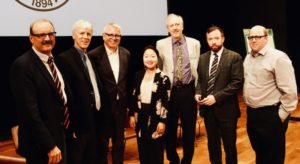Glimpses of party priorities on electrification and vehicle autonomy surface as Toronto-area candidates square off on transportation

From left: Andy Manahan, Residential and Civil Construction Alliance of Ontario; Martin Collier, Transport Futures; Adam Vaughan, Liberal Party; Diana Yoon, NDP; Tim Grant, Green Party; Ben Spurr, Toronto Star; Kevin Sack, 407 ETR. Photographer: Robert Davis
Glimpses of party priorities on electrification and vehicle autonomy surface as Toronto-area candidates square off on transportation
With the federal election campaign up and running, candidates from the Greater Toronto Area gathered this week to debate transportation futures. Electric Autonomy Canada attended to see what the parties are saying — officially or unofficially — about electrification and self-driving cars in this area.
The Liberals fielded incumbent downtown MP Adam Vaughan, while prospective parliamentary candidates Diana Yoon (Spadina-Fort York) represented the NDP and Tim Grant (University-Rosedale) appeared for the Greens. People’s Party candidate Renata Ford (Etobicoke North) was invited but did not show while the Conservatives decided not to participate.
The three speakers said they support continued federal tax rebates for electric car purchases
Transport is vital
Debate organizer and Transport Futures founder Martin Collier set the stage: “Transport is vital to tackling climate change representing 24 per cent of [Canada-wide] greenhouse gas emissions. And that doesn’t include the emissions included in building the infrastructure.” Toronto Star transport reporter Ben Spurr then took over as moderator.
Climate change is a uniting factor for the three parties. Grant of the Greens declared: “We need to be off all fossil fuels by 2050” and “to electrify all transport by 2040.” Liberal MP Vaughan touted his party’s major 2018 investment pledge in national infrastructure, which included $28 billion for public transit and also brought municipal pedestrian and cycling schemes into the federal funding model. Yoon was keen to stress the NDP’s “equity first” approach and their offer of fare-free public transit.
More rebates
The three speakers said they support continued federal tax rebates for electric and plug-in hybrid car purchases. (This, after moderator Spurr noted that 14,000 Canadians had taken advantage of the $2,500 to $5,000 incentives since the Incentive for Zero-Emission Vehicles program launched May 1.)
Earlier this summer, the federal Liberals agreed to collaborate with the state of California on vehicle emission standards (a plan made more complicated by President Trump’s move this week block California’s right to set its own standards). Vaughan, perhaps hinting at a next step, expressed his desire for Canada to follow that state’s approach to electrification. “California has the largest share of electric vehicles in the U.S. because it has the strongest regulations. When you put in place the rule, the market will follow.”
“My biggest fear of electric vehicles is that we continue our mode of planning”
Adam Vaughan, Liberal Party of Canada MP, Spadina-Fort York
Link housing and transit
But it wasn’t all enthusiasm for EVs or AVs. “Cities are our biggest source of emissions, so we must build good cities, putting housing and transit together,” Vaughan added. “My biggest fear of electric vehicles is that we continue our mode of planning.”
Grant agreed: “We need to have harder, bigger and more ambitious targets to reduce vehicle use.”
“We need to look at incentivizing production of zero-emission vehicles in Canada“
Diana Yoon, New Democratic Party of Canada Candidate, Spadina-Fort York
There was general enthusiasm from the panel for Canadian-made electric buses. Both Vaughan and Grant referenced Canadian electric bus manufacturers New Flyer Industries and Nova Bus in relation the City of Brampton’s federally supported July announcement to acquire eight electric transit buses.
Yoon stressed an NDP position that the country should create alternatives for at-risk fossil-fuel jobs by investing more in the production of zero-emission vehicles in Canada. “We need to look at incentivizing production of zero-emission vehicles in Canada,” she said. “That means expanding bus fleet electrification and electrifying government owned fleets.”
“EVs and AVs are certainly not the answer in our cities”
Tim Grant, Green Party of Canada Candidate, University-Rosedale
AV safety concerns
On autonomous vehicles the panel voiced safety concerns. The NDP’s Yoon warned that “we have to look very seriously at pedestrian safety.” Grant was more sceptical: “EVs and AVs are certainly not the answer in our cities.” Adam Vaughan also stressed the need to protect pedestrians: “We have to be very careful how we adopt new technology.” However, he was more supportive of the need for pure and applied research wanting government to set criteria to screen technology for the right uses.
Our takeaway? Though just a snapshot, the debate highlighted what views the three left-of-centre parties share on transportation. Two keys themes: improve urban transit and boost the market for EVs through federal support. But while they agree on big targets, there are clear differences on the desired pace of change and the levers they’d use to drive the transition.






